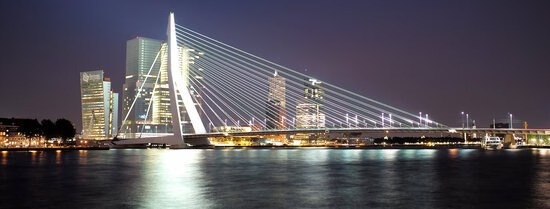With 80% of its land below sea level, Rotterdam should be aware of its vulnerability. After the flood of 1953, the city prepared itself. But can we do more? That question will feature centrally in Theresa Audrey O Esteban’s talk, urban planner and PhD candidate at the Erasmus School of Social and Behavioural Sciences. Her talk will take place on September 28th during the Science Hotel event. We called her to find out if we should worry about the rising sea levels.
Hi Audrey! Could you tell us a little more about your research?
For my dissertation I am looking at four cases of cities that are disaster prone, specifically to flooding. I don’t only look at the structural side, as in flood gates or dykes, but also at how people can work together in case of something happening. If we are not aware of what disasters could hit us, and what the risks and vulnerabilities are, the consequences could be more severe. I have worked on projects in flood-prone areas in the Philippines and Vietnam for example. I have seen that people who work together are able to rebuild faster than those who don’t. This is true on a personal level as well as in a city-context. If you don’t know that Rotterdam could be hit by a flood, how will you know how to react?
But aren’t we very well prepared with our advanced waterworks and dykes?
The Netherlands learned how to respond to flooding after the deadly flood of 1953. But what we see now is that many people these days don’t see the importance of preparing for something that could happen. A disaster happens so rarely, but what if that one day is tomorrow? It’s not to alarm people, but they should understand the importance of being prepared. In Japan, for example, natural disasters happen often. But Japan is a very prepared country, the people are taught starting in pre-school how to react to possible disasters. In the Netherlands, during the big storm at the beginning of this year, two people died. It’s not hundreds of people, but still something we should prepare for. A disaster hits everybody, not just the poor or the rich. It’s an equaliser.
How does Rotterdam currently handles being prone to flooding?
I noticed that a lot of people do not know Rotterdam is part of the 100 Resilient Cities [100 Resilient Cities is established by The Rockefeller Foundation and is dedicated to helping cities around the world become more resilient in facing the physical, social and economic challenges that are a growing part of the 21st century. In 2007, Rotterdam announced its ambition to become 100% climate-proof by 2025 — able to continue functioning economically and socially with minimal disturbance under any extreme weather situation – Ed.] It makes Rotterdam more prepared than other cities and countries. It doesn’t just help the infrastructure, it’s also helping raise awareness. Lots of people see Rotterdam as a port city, but I think people should think of Rotterdam as a resilient city and should be proud of it. I’m a proud Rotterdammer. Whenever people hear that I live in the Netherlands they ask me if I live in Amsterdam, but I live in Rotterdam! It’s a big city but with more heart. And the work mentality is great. Throughout history people here have worked together to come out strong. Being one of the Resilient Cities is something Rotterdammers should be aware and proud of.
Will Rotterdam be able to meet the goal of becoming 100% climate-proof by 2025?
I think it is doable. Rotterdam has a very capable City Resilience Officer and the city is working hard to make this happen. But I also feel that we as citizens have a lot to do to make this goal achievable. We can’t just rely on the government, we also have to do our homework, which means being involved, participating, and learning so we’re informed and aware at all times.
So what can Rotterdammers do to prepare if anything happens?
As a citizen, be aware of the environment. Do not just throw your trash anywhere, make sure you don’t clog the drains. I like the fact that Erasmus University students went Plogging (jogging while picking up trash at the same time) for World Cleanup Day. Besides this, the government should work together with the people to become more aware of what could happen, or could be done.
Are we foolish in feeling safe?
If you live with disasters you are always hungry to learn, but if you feel that nothing is going to harm you, you become complacent. We have become a little spoiled because of our good infrastructure. The Netherlands is the most vulnerable country in Europe in the case of a natural disaster occurring, according to the World Risk Index. But the good thing is that although we are exposed geographically, we are also one of the safest countries to live in because of our preparedness for natural disasters. So we don’t have to be afraid! Just be aware and be prepared. That helps in making us much more resilient.
Photo banner (CC): Roman Boed
- More information
Come listen to Audrey Esteban's speech during Science Hotel on 28 September, or Science Open on 29 September.

